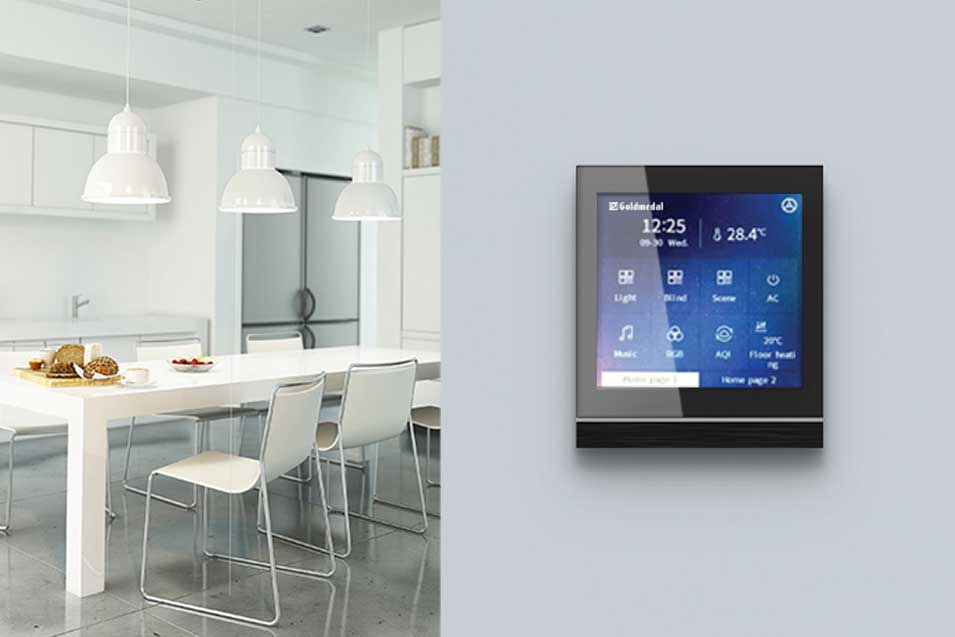
Factors to consider before selecting a home automation system
The idea of a smart home is becoming increasingly popular. Home automation offers unmatched control and ease. It allows homeowners to control lights, temperature, security, and entertainment with just a button press or a voice command. However, given the vast array of options available, choosing the right home automation system can be daunting. This blog aims to guide you through the key factors to consider before selecting the most suitable home automation system for your home.
Key factors for home automation system:
- Compatibility with Infrastructure: Before diving into the world of home automation, it’s crucial to assess your current home infrastructure. Consider the compatibility of the new system with existing wiring, Wi-Fi strength, and the gadgets you own. It’s often more cost-effective to choose a system that works seamlessly with your existing appliances and devices rather than replacing everything from scratch.
- Scalability and Flexibility: The landscape of home automation is not static; it’s an ever-evolving journey. The features and functionalities you desire today might not align with your needs a few years down the road. That’s why it’s crucial to choose a system that’s not just effective now, but also adaptable for the future. Seek out a system that excels in scalability and flexibility, one that effortlessly welcomes new devices and features, syncing with the rhythm of your changing lifestyle. This foresight ensures your home automation solution grows with you, making it a timeless investment.
- User Experience and Interface: The best home automation system is one that has an intuitive and user-friendly interface. Whether it’s a mobile app, a wall-mounted panel, or voice commands, the method of interaction should be straightforward and pleasant. Test the system before purchasing to ensure it meets your expectations for ease of use.
- Security Features: Choose a system with robust security features to protect against hacking and unauthorized access. As home automation systems connect to your home’s network, security is paramount. Ensure it supports secure communication protocols and offers regular software updates to safeguard your home’s digital integrity.
- Integration with Smart Assistants: Integration with smart assistants like Amazon Alexa, Google Assistant, or Apple’s Siri can significantly enhance the functionality of your home automation system. If you’re already using or planning to use these assistants, ensure the system you choose is compatible with them.
- Cost and Budget: Cost is a significant factor in choosing a home automation system. It’s not just the initial purchase price; consider the long-term costs, including maintenance, upgrades, and energy consumption. Set a realistic budget that includes these factors and stick to it.
- Energy Efficiency: An often overlooked aspect of home automation is energy efficiency. Systems that allow you to monitor and control energy usage can lead to significant savings in the long run. Look for features like smart thermostats, energy monitoring, and automated lighting systems.
- Brand Reputation and Support: Choose a brand with a good reputation for quality and customer support. Research online reviews and ask for recommendations from friends or family. Good customer support can make a big difference, especially when you encounter issues or need assistance with your system.
Conclusion
Selecting a home automation system is an exciting step towards a smarter, more efficient home. By considering these factors, you can ensure that the system you choose not only meets your current needs but also adapts to future changes, providing comfort, security, and convenience for years to come. Remember, the key is to find a balance between functionality, security, ease of use, and budget to truly make your home smart and your life easier.
Frequently Asked Questions (FAQs) :
Q1. How do I know if a home automation system is compatible with my existing devices?
To check if a home automation system is compatible with your existing devices, start by listing your devices and their communication protocols (e.g., Wi-Fi, Zigbee, Bluetooth). Then, research the home automation system for its supported protocols and compatibility information, often available on the manufacturer’s website.
Q2. Are all home automation systems scalable for future upgrades?
Not all home automation systems are scalable for future upgrades. The scalability often depends on the system’s architecture, compatibility with different protocols (like Wi-Fi, Z-Wave, Zigbee), and the manufacturer’s commitment to software updates and support for new devices.
Q3. What steps can I take to enhance the security of my home automation system?
To enhance the security of your home automation system, regularly update all device firmware and software to patch vulnerabilities. Use strong, unique passwords for each device and your Wi-Fi network, and consider a separate network for smart devices. Enable two-factor authentication where available, and routinely monitor device activity logs for any unusual activity.
Q4. Can I install a home automation system on my own, or do I need professional assistance?
Whether you can install a home automation system yourself depends on the complexity of the system and your technical skills. Simple plug-and-play devices or basic systems often allow for DIY installation. However, for more complex setups involving wiring, integrating multiple systems, or advanced configurations, professional assistance is recommended to ensure proper setup and safety.
Q5.Are there any privacy concerns associated with home automation systems?
Home automation systems can raise privacy concerns, primarily due to the collection and storage of personal data, including habits and routines. These systems, often connected to the internet, are also susceptible to hacking, potentially exposing sensitive information. It’s crucial to understand the data security measures and privacy policies of the system’s manufacturer and to ensure your home network is secure.
Q6. What should I consider when evaluating the warranty of a home automation system?
When evaluating the warranty of a home automation system, consider the length of the warranty period, what aspects it covers (such as hardware defects, software updates, or technical support), and any exclusions or limitations. It’s also important to understand the process for claiming the warranty and whether it requires additional costs, like shipping fees for repairs or replacements.

